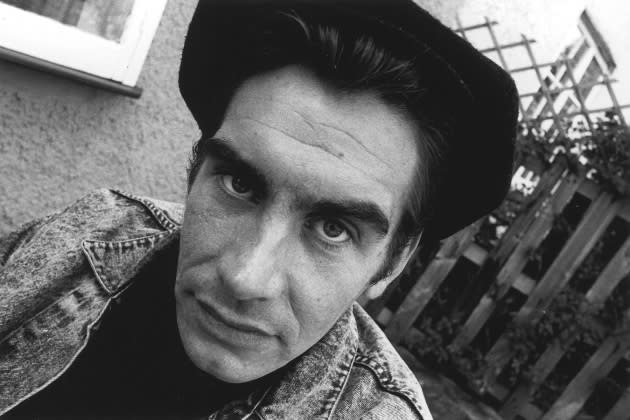Mark Stewart, the Pop Group’s Activist-Vocalist, Dead at 62
- Oops!Something went wrong.Please try again later.
- Oops!Something went wrong.Please try again later.

Mark Stewart, the hulking and dynamic vocalist who shouted, whispered, and squealed over the Pop Group’s dubby, deconstructionist post-punk, died early Friday morning. A rep confirmed the singer’s death to Rolling Stone but did not disclose any additional details. He was 62.
“Mark was the most amazing mind of my generation, RIP,” the Pop Group’s guitarist and saxophonist, Gareth Sager, said in a statement.
More from Rolling Stone
Barry Humphries, Australian Comic Who Starred as Dame Edna, Dead at 89
Al Jaffe, 'Mad' Magazine Cartoonist Who Created the 'Fold-In,' Dead at 102
“Thank you, my brother,” dub artist and one of Stewart’s longtime collaborators, Adrian Sherwood, said. “You were the biggest musical influence in my life and our extended family will miss you so, so much. Love forever.”
Stewart, born Aug. 10, 1960, grew up in the English city of Bristol, where he immersed himself as a teenager in the city’s funk and reggae scenes. “We were the Bristol Funk Army,” Stewart recalled of his friend group in author Simon Reynolds’ book, Rip It Up and Start Again. “We’d go to clubs and dance to heavy bass-line imports from America, tracks by B.T. Express, Fatback Band, Ultrafunk. I was 14 in 1975 but could get into clubs because I was six foot seven.” Stewart also recalled going to his local record store around that time and buying pre-release reggae records.
The Pop Group formed in 1977, billing themselves as “beatniks of tomorrow,” according to Rip It Up, and embraced the experimental spirit of Beat literature, amalgamating multiple musical ideas into singular songs. Proving their name ironic, they released singles without clear-cut hooks. “We Are All Prostitutes,” an early seven-inch that made it up to Number Eight on the U.K.’s indie chart, finds Stewart shouting the title, gurgle-throated, and repeating lines like “consumer fascism” over funky rhythm guitar. “She Is Beyond Good and Evil” sounds like a Nile Rodgers-style disco song refracted off some alien satellite, as Stewart sings all echoey, “There’s no antidote for her.” Their sounds were so fresh they graced the cover of England’s NME in 1978 before even releasing a record.
“We’d listen to Funkadelic at parties, and somebody would say, ‘Let’s play that,'” Stewart later told Rolling Stone. “Then somebody would play Richard Hell or early Television guitar over it. It felt like we were playing three songs at the same time, which I thought was because we couldn’t really play. But these older guys, like Richard Williams in Melody Maker, said it was very cool and experimental, so I just kept quiet.”
Their self-released album, 1979’s Y, sounds even weirder in hindsight as medleys of funk, disco, reggae, and punk congeal and melt at will. Their second full-length, released on their own Y Records — whose title For How Much Longer Do We Tolerate Mass Murder? reflects their activist mindset (inspired by Nixon and Kissinger) — continues their unpredictable genre shifts, but in a way that’s more friendly to dancing. They gigged with Patti Smith, Elvis Costello, the Stranglers, and Pere Ubu in their early days.
The Group broke up in 1980, as Stewart’s interests drifted deeper into reggae and his bandmates wanted to explore free jazz. Also, Stewart spent three months working for the Campaign for Nuclear Disarmament, helping to organize a rally in Trafalgar Square. The event, in front of an estimated quarter of a million people (Stewart would tell people it was half a million), would be the Pop Group’s last concert of its first run. Stewart described the breakup as “an organic disintegration” in Rip It Up. The Pop Group later re-formed in 2010 and put out two full-lengths. Stewart’s final concert with the band took place in the ruins of a Coventry cathedral.
Stewart released his first solo, an EP titled Jerusalem, in 1982. Dub artist Adrian Sherwood, who would collaborate with Stewart on future releases, produced the record. Stewart’s arty, hip-hop/industrial single “Hypnotised,” off his second full-length, 1985’s As the Veneer of Democracy Starts to Fade, reached the Top 10 of Britain’s indie chart, as did “Stranger Than Love,” off 1987’s Mark Stewart. The latter combines a Satie piano line with lyrics from West Side Story’s “Somewhere.” Stewart sporadically put out solo albums through 2022’s Vs., which found him working with Lee “Scratch” Perry, Mike Watt, and others. Throughout his life, Stewart also collaborated with Trent Reznor, Tricky, Massive Attack, Chicks on Speed, and Primal Scream.
In Rip It Up, Stewart maintained that his mission musically was one of hope. “[We were] not wanting just to be alive but to rid yourself of all constrictions,” he said of the Pop Group. “We had this romantic idea of going through nihilism, this intense deconditioning process, and emerging on the other side with something really positive.”
Best of Rolling Stone
